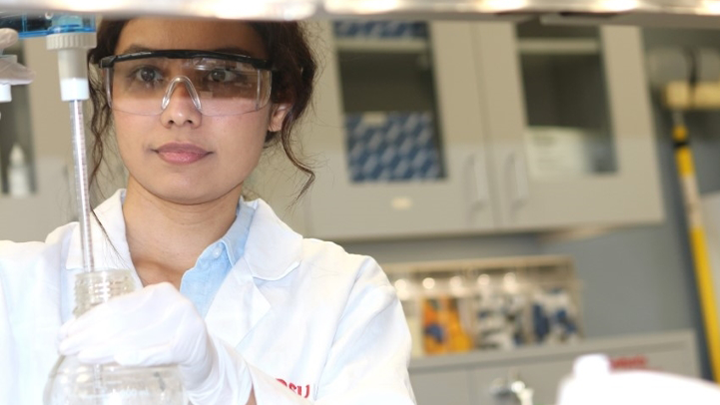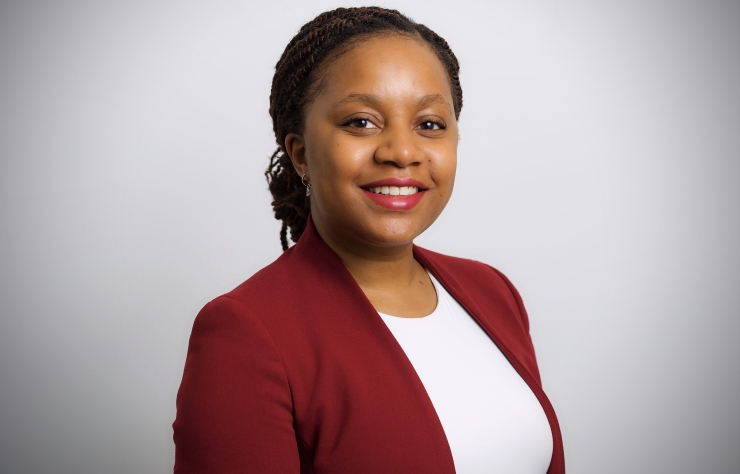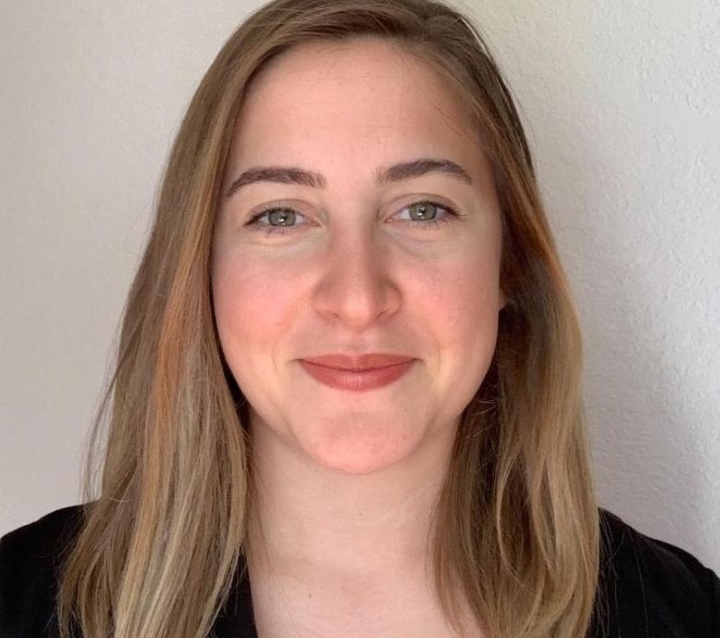SDSU international women grad students bring diversity to research
Candidates in SDSU/UCSD Joint Doctoral Programs are engaged in complex scientific studies spanning cancer, water quality and immigrant health.

Maryam Fani analyzes surface water for microbial clues on the source and age of human pollution that could make people sick.
Nicole Karongo researches strategies for guiding African immigrants around the nutrition pitfalls in the U.S. food landscape, benefitting their long-term health.
After her grandmother’s ovarian cancer diagnosis, Esra Tiftik was surprised by the lack of effective late-stage cancer therapies. Now she crunches big data in computational models on what triggers breast cancer to spread.
These women scientists are international students in joint doctoral programs between SDSU and the University of California San Diego. Their work highlights the depth and diversity of SDSU’s degree-seeking international cohort's academic pursuits, particularly women in male-dominated scientific fields. Here is a snapshot of the science they are advancing.
Tracking Pathogens
A native of Iran, Fani fought to find research projects as a civil engineering undergraduate but initially faced skepticism over her ability to manage the physical demands of fieldwork. She persisted, and eventually a professor gave her a chance to join a short-term project. It was a turning point, resulting in Fani leading her own research projects thereafter.
Fani came to SDSU alone in 2019 and found her footing, in part, by joining the Safe WaTER Lab, run by one of her Ph.D. advisors, Assistant Professor Matthew Verbyla, in the Department of Civil, Construction, and Environmental Engineering.
While working at the lab, she propped open maintenance hole covers to collect and analyze wastewater for traces of COVID-19 on campus. She worked on a government water agency project, testing samples from around the county for pathogens.
These experiences hooked her on environmental engineering. “I feel even though it is engineering, our impact is very related to human health,” she said.
Now, she is pursuing next-generation research on fecal pollution source tracking in her doctoral thesis. The crux of the project involves understanding the different decay rates of two target biomarkers in human waste under myriad environmental conditions, such as sun exposure and water temperature.
That enables researchers to compare decay ratios and calculate how far pollution has traveled and how old it is.
“This is important to know because if the pollution is new, it potentially has more pathogens,” said Fani. “So, we try to identify if the pollution is a small amount of strong, new pollution with a source nearby or a large amount of decayed pollution traveling from a farther location.”
Fani wants to understand further the correlations between these biomarkers and fecal pathogens to better predict health risks from contaminated surface water.
“It is very time-consuming and very expensive to analyze one sample for many pathogens,” she said. “But if we analyze it for these two targets always, can these two targets tell me if I have (pathogens) there or not?”
 Zimbabwe native Nicole Karongo studies ways to improve nutrition for African immigrants trying to navigate the unfamiliar U.S. food landscape. (Photo courtesy of Nicole Karongo)Diet and Immigrant Health
Zimbabwe native Nicole Karongo studies ways to improve nutrition for African immigrants trying to navigate the unfamiliar U.S. food landscape. (Photo courtesy of Nicole Karongo)Diet and Immigrant Health
Karongo came from Zimbabwe to Minnesota in 2013 for her undergraduate studies. After earning her master’s degree, she came West to begin her public health doctorate with a focus on behavior, nutrition and chronic disease prevention.
Karongo developed strong convictions about the widespread impacts of food after she helped her father with a medically tailored diet during his recovery after cancer treatments. She planned to practice as a dietitian in clinical settings but pivoted to public health because it allows her to be “a little more upstream in prevention” of diet-related health problems.
Research shows immigrants often come to the U.S. healthy but experience a decrease in their cardiometabolic health after about a decade, said Karongo. Her research is testing whether community-based nutrition interventions to improve diet quality can have a positive influence.
She is working with the East African immigrant population served at the United Women of East Africa Support Team (UWEAST) in San Diego on how they are approaching healthy eating and the food environment since moving to the U.S., and what they would like to see in a nutrition intervention that emphasizes herbs and spices to decrease sodium, fats and sugars in their diet.
Next, she plans to help create a cooking class curriculum focused on both nutrition guidelines and what immigrants requested in a program to foster healthy eating.
“We are thinking about this not only as how people should eat but also what the community wants to learn,” said Karongo. “So, we are prioritizing a community-engaged approach.”
Her doctoral advisors include Cheryl Anderson, dean of the Herbert Wertheim School of Public Health and Human Longevity Science at UCSD; Professor Noe Crespo, division head of the Health Promotion and Behavior Sciences program at SDSU’s School of Public Health; and Distinguished Professor Connie Weaver from SDSU’s School of Exercise and Nutritional Sciences.
Karongo said she is privileged to have the support of empowered women in her academic journey. Women lead her primary research lab, the Anderson Lab, and United Women of East Africa, which is an example of a women-driven service for San Diego immigrants and their families.
“I feel honored to have been surrounded by female excellence in research and advocacy,” she said.
Cancer Cell Conundrum
Tiftik earned an undergraduate degree in chemical engineering from her native Turkey before pursuing her master's degree at the University of Southern California.
She expected to follow the same academic track but began working in the computational systems biology lab. It brought back memories of her grandmother’s death from cancer, sparking Tiftik’s interest in applying powerful computational models to cancer research.

She entered the bioengineering joint doctoral program at SDSU and UCSD in 2019, working in SDSU’s Computational Active Matter Lab with advisor Associate Professor Parag Katira and the Fraley Lab with co-advisor Associate Professor Stephanie Fraley at UCSD.
“In both my labs, we try to understand why cells leave their original location and move to other parts of the body,” she said. “What kind of forces cause cell movement? This is an important function, but we do not know exactly why this is happening with cancer cells.”
Tiftik focuses on breast cancer and the factors that might spark their migration, such as DNA, protein interactions, and environmental factors such as hormones and nutrition.
“The reason we are using the computational model is it really helps us use large data on genes, and we can run multiple scenarios, like when they have high hormone levels, high nutritional levels, or high surrounded fibrous proteins. These are all environmental factors we must consider.”
Tiftik thinks the research could enable early identification of cells with high potential to spread. “And this allows you to provide treatment, targeted treatment, before they get into the metastatic stage,” she said.
As a woman scientist, Tiftik said one challenge is the scarcity of female role models in male-dominated science professions, which can create feelings of isolation and uncertainty for aspiring female scientists.
However, she hopes to improve the gender ratio after completing her Ph.D. and staying in the U.S. to build a career.
“San Diego is a hub for bioengineering,” she said. “I am just so lucky to be part of this city because there are so many companies interested in what I am looking for.”



